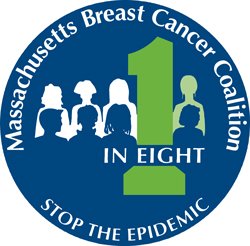Massachusetts Breast Cancer Coalition believes that far too many women are needlessly diagnosed with breast cancer. Over the past several decades the breast cancer rate has increased dramatically, from an estimated 1 in 20 in 1940 to more than 1 in 8 today. Incidence rates have increased over 40% in the past four decades.
Surprisingly, only 5-10% of breast cancer diagnoses are associated with the BRCA1 and BRCA2 gene mutations, with another 15-20% of breast cancers linked to lifestyle factors, such as diet and exercise.
This leaves over 70-80% of breast cancers largely unexplained.
Nonetheless, an increasing body of evidence links toxins found in common consumer products and services, as well as manufacturing and other sources, with the development of the disease. From the February 2013 Federal Interagency report, “Breast Cancer and the Environment: Prioritizing Prevention,” we know that complete toxicological screening data is available for only 7% of the over 84,000 chemicals currently registered for use. This includes toxicological data on health effects like breast cancer, reproductive defects, and more.
According to our sister organization, Silent Spring Institute, we have cause to be concerned with many chemicals and ingredients found in our air, water, food, consumer and industrial products, and services. Specifically, existing research has revolved around several categories of pollutants and chemicals: polychlorinated biphenyls (PCB’s), polycyclic aromatic hydrocarbons (PAH’s), dioxin, and organic solvents (see the Mammary Carcinogens Review Database for further explanation).
Published reports by the Presidential Cancer Panel, entitled, “Reducing Environmental Cancer Risk,” and the Federal Interagency Breast Cancer and Environment Research Coordinating Committee, entitled “Breast Cancer and the Environment: Prioritizing Prevention,” corroborate these breast cancer carcinogens as well as lists many more.
This is only the tip of the iceberg.
According to the Federal Interagency report, only about 7% of Non-Governmental Organization funding goes towards breast cancer prevention and only 10-11% of breast cancer grant funding by the National Institute of Health and Department of Defense focus on environmental health. That means, we don’t have sufficient information on many potential environmental links to breast cancer that are present in our daily lives. Until we know what does and does not contribute to breast cancer incidence, the Massachusetts Breast Cancer Coalition will advocate for more resources dedicated towards breast cancer prevention research investigating environmental contaminants linked to the disease.
We hope you will join us in our quest to end this disease by asking the question – What is causing breast cancer and how can we stop it?
